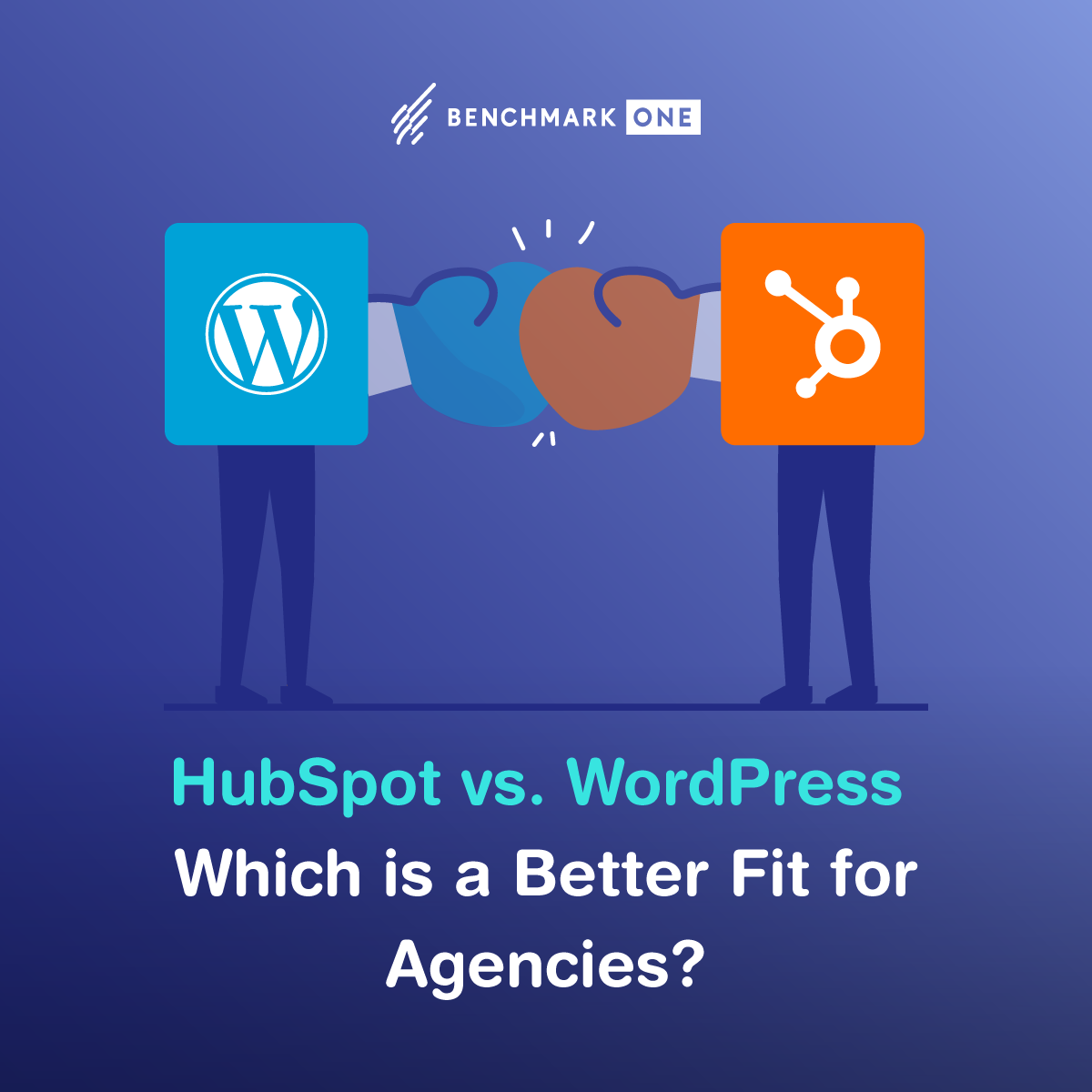There are a lot of decisions that you have to make when you’re running a marketing agency. Some of them are easy; some of them not so much — and we think that choosing your CMS platform probably falls in the second category.
Both HubSpot and WordPress provide backend software that agencies can use to build and maintain their websites. But there are a lot of differences that you need to consider if you’re deciding between the two, particularly when it comes to cost efficiency and ease of use.
How do you break it all down? We’ve put together a helpful comparison of HubSpot vs. WordPress for you so that your agency can simplify the decision-making process and more easily see the differences between the two platforms.

What Is a CMS?
HubSpot and WordPress both fall under the designation of CMS — a.k.a. content management systems.
A content management system is a platform where you can build and manage your website, including blog hosting, online lead generation forms, and SEO.
Download our SEO Checklist to ensure your website is optimized for search.
It’s really no longer an option to opt-out of having a website entirely (especially as a marketing agency that wants to help their own clients achieve digital supremacy). Instead, you need to be evaluating your available CMS options and choosing which one is most closely aligned with your marketing budget and your needs.
There are countless CMS platforms out there for you to consider. We’ve narrowed it down to WordPress vs. HubSpot because these tend to be two options that appear on every business’s list of top CMS providers — and for good reason. Aside from name recognition, these platforms offer lots of the utility and security features that most companies need. However, the specifics vary, and you’ll want to understand how if you’re deciding between the two.
Fundamental Differences: HubSpot vs. WordPress CMS
When it comes to market shares, WordPress takes the cake, powering nearly 40 percent of all websites compared to just 0.3 percent for HubSpot CMS.
WordPress got its start as a blogging platform and has stayed mostly true to its original roots, despite branching out into the open-source CMS platform that we know it as today. Meanwhile, HubSpot does a little bit of everything, including marketing automation and offering a customer relationship management (CRM) system.
Check out our free CRM comparison guide to see how BenchmarkONE’s free CRM stacks up against other similar software plans.
This leads us to what is perhaps the most notable difference: WordPress is primarily CMS focused, while HubSpot comes with lots of additional bells and whistles. Both have advantages, of course, but it depends on exactly what you need. For agencies that are simply looking for an effective, well-rounded CMS, HubSpot might offer too much stuff — along with a cost that reflects that breadth of added features.
When you’re comparing HubSpot vs. WordPress, it’s not enough to just look at the big picture. Narrowing in just on their CMS capabilities, here’s a look at how they compare on a number of key points.
Web Builds
Website management is obviously a big part of any CMS. Both HubSpot and WordPress offer a wide range of tools for building, managing, and updating your website. Expect an easier learning curve with WordPress since its interface is so simple and streamlined. With HubSpot, you’ll have more overall features and customization options to choose from, but it’s going to take more effort to get your project off the ground.
Blogging
Both platforms offer a ton of utility for hosting a blog and all of the things that come with it, including audio and visual assets.
Where they differ is in terms of complexity. HubSpot has lots of built-in blogging features that are ready to put to work, such as SEO tools, mobile optimization, and analytics. You can do all the same things on WordPress, but you’ll have to build many of the tools through downloadable widgets and plugins instead of having them ready from the get-go. This isn’t necessarily a disadvantage, though, since WordPress has a massive open-source marketplace for widgets, which allows you to pick and choose exactly what you need — no more and no less.
Landing Pages
Landing pages are an essential part of any website. Where HubSpot and WordPress differ is (again) in what’s included versus what you have to add yourself. Many agencies like having the freedom to pick and choose their landing page features, while others prefer to have them baked in from the get-go.
Which One is Right for Your Agency?
As with all software decisions, it depends! HubSpot definitely edges out WordPress in terms of standard features, but WordPress offers all of those and more through its open-source marketplace. Plus, WordPress usually ends up being more cost-effective since you’re only going to pay for the features you want and use.
We recommend evaluating your precise needs and then comparing prices and features to find your best fit. However, keep in mind that if you decide to use HubSpot, you have to be all-in. Unlike WordPress, with HubSpot, you don’t get the freedom to use other marketing tools in conjunction, so there’s a bigger commitment to the platform and the cost.
